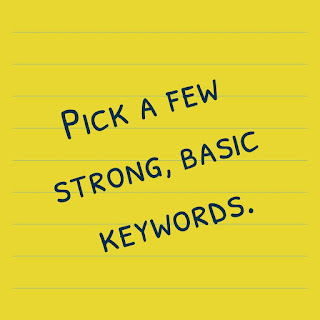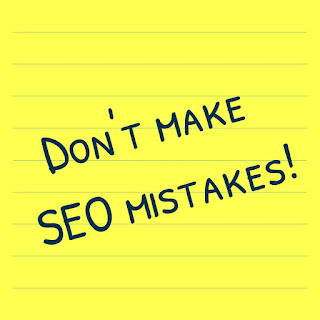Everyday at Powell Lawson Creatives, I read a pile of client briefs that describe exactly what they want in a creative piece. They usually need an article, blog, or catalog description. About a third of what I read shows they don't understand search engine optimization (SEO) to the point that they're hurting their business or brand. Without naming names, I'll present the most common mistakes and how to fix them so you optimize your SEO, bring more visitors to your media and better build your brand. The following tips apply to single or blog posts, not websites as a whole.
Not Knowing What a Keyword Is
A keyword in SEO means a search term. It is what you would type into a search box to find relevant results. Your name is a keyword. Your business' name qualifies as a keyword, too. Your occupation, the service you provide, the main topic of your blog or article all qualify as keywords. Not to get too grammatical but, articles, conjunctions, prepositions and pronouns are not keywords. Nope. (More on this later.)


Requesting no keywords.
If you request no keywords in your creative piece, you do yourself and your brand a disservice. Each blog or article needs at least one keyword or natural language keyword
phrase. Choose your company or brand name as the less subtle choice. Choose the name of the service you provide as the more subtle choice.
Requesting too many keywords.
Repeating Keywords Too Much
Some clients not only request too many keywords, but too many repetitions of keywords. You may need one keyword to repeat many times. Try not to exceed five to seven repetitions. Ideally, use one to three keywords repeated one to three times. Anything more than that can negatively impact your ranking. The search engine algorithm will dock you for keyword stuffing. Minimal keyword
density works best.
Natural Language vs. Keyword Language
Too many briefs request multiple keywords strung together. It either creates gibberish phrases or poor grammar. Natural language means how you would actually say it using proper grammar when speaking or writing.
Incorrect: Whipple Maserati Nome Alaska
Correct: Whipple Maserati in Nome, Alaska
Search engines ignore connecting words like prepositions (in), conjunctions (and), and punctuation. When you request an article using keyword language instead of natural language, the result reflects poorly on your brand because you force the writer to use incorrect grammar and punctuation. You look bad to search engines who see it as keyword forcing and/or stuffing. You look bad to readers who see it as incomprehensible. Enter each word or phrase as a separate keyword item. For instance, enter "Whipple Maserati" as one keyword phrase and "Nome, Alaska" as a separate one. If it's offered on the brief form always choose to allow connecting words.
Okay, you can call it misusing or misunderstanding, either way, it hurts you. If you have a small business or just started a blog, you may not have the coin to hire a SEO consultant. Some apps can and do extract keywords from your competition's websites and blogs. Some simply exact every word more than one site uses.
True (horror) story: I once received a brief from a client requesting 99 keywords. New to SEO and on a tight budget, they had used one of the keyword extraction apps to mine their competition's sites. Despite my best efforts to explain SEO and how these unneccessary words and phrases would hurt their SEO efforts and the article's readability, they kept the request as is. One of the "keywords" the app identified? "That." Folks, "that" is NOT a keyword. The app only works as well as your understanding of what it does. The well designedapps mine keywords. The poorly designed apps merely return words used on each site. Know the difference. Choose a well designed app and use the top three to five resulting keywords.
Next time you search for something online, look down at the bottom of the page. Both Bing and Google optimize results by location. As creepy and Big Brother as it is, it can help you draw business. If your business relies on local customers, you need to make your city and state or country one of your keyword
I read a ton of briefs from people who want no links in the article. This hurts them in so many ways including loss of credibility, decreased rank and fewer visitors. What does linking
to relevant sites do?
Incorrect: Whipple Maserati Nome Alaska
Correct: Whipple Maserati in Nome, Alaska
Search engines ignore connecting words like prepositions (in), conjunctions (and), and punctuation. When you request an article using keyword language instead of natural language, the result reflects poorly on your brand because you force the writer to use incorrect grammar and punctuation. You look bad to search engines who see it as keyword forcing and/or stuffing. You look bad to readers who see it as incomprehensible. Enter each word or phrase as a separate keyword item. For instance, enter "Whipple Maserati" as one keyword phrase and "Nome, Alaska" as a separate one. If it's offered on the brief form always choose to allow connecting words.
Misusing Keyword Extraction Tools
True (horror) story: I once received a brief from a client requesting 99 keywords. New to SEO and on a tight budget, they had used one of the keyword extraction apps to mine their competition's sites. Despite my best efforts to explain SEO and how these unneccessary words and phrases would hurt their SEO efforts and the article's readability, they kept the request as is. One of the "keywords" the app identified? "That." Folks, "that" is NOT a keyword. The app only works as well as your understanding of what it does. The well designedapps mine keywords. The poorly designed apps merely return words used on each site. Know the difference. Choose a well designed app and use the top three to five resulting keywords.
Ignoring Local SEO opportunities.
phrases. Whether you bake wedding cakes or plumb houses, this can help you increase your search ranking and draw more business. Also, include your location in the meta data of your website. Search engines use local SEO data to provide the top results since the plumber three blocks from your house makes a much more relevant result than one living one thousand miles away.
Not Linking to Other Sites
- Linking to sources adds credibility.
- Linking to sources increases SEO rank.
- Linking to sources can get you links back to your site.
Some clients worry that a link will take readers away from their site or encourage them to use the competition. Put your mind at ease by having the writer or your web designer set the links to open in a separate, background window. Also, direct the writer to use relevant, non-competitor sources. That does not mean they can't use other plumbers' blogs, for instance. It means they should not use other plumbers' blogs within a 100 mile radius of your business. Your competition means someone actually competing for the same work you do. The writer linking to a plumber in Los Angeles when your business is in Miami does not qualify as a link to your competition. Notice the linked information in this article. I run a creatives company that provides written, photographic and musical pieces to individuals and companies. That means linking to the blog of a publicist or SEO consultant provides validity without linking to my competition.
Using SEO properly can increase your search engine rank, help build your brand, and bring you more customers. Get the most from the money you spend on the creative pieces for your brand by crafting the best requests. I have to brew another cup of coffee and return to the
briefs pile now.
***
| Carlie Lawson writes about tech, mobile and online video, entertainment, sports and fashion. She wrote forJollyJo.tv, Keysian and Movitly for a combined seven years. A former newspaper journalist, she now mostly ghost writes for her clients via her company, Powell Lawson Creatives. Invalid Inputs is her first independent, formal blog. She earned BAs in Journalism and Film & Video Studies from the University of Oklahoma. She also earned her Master of Regional & City Planning at OU. She has worked as a model since she was 17. |







